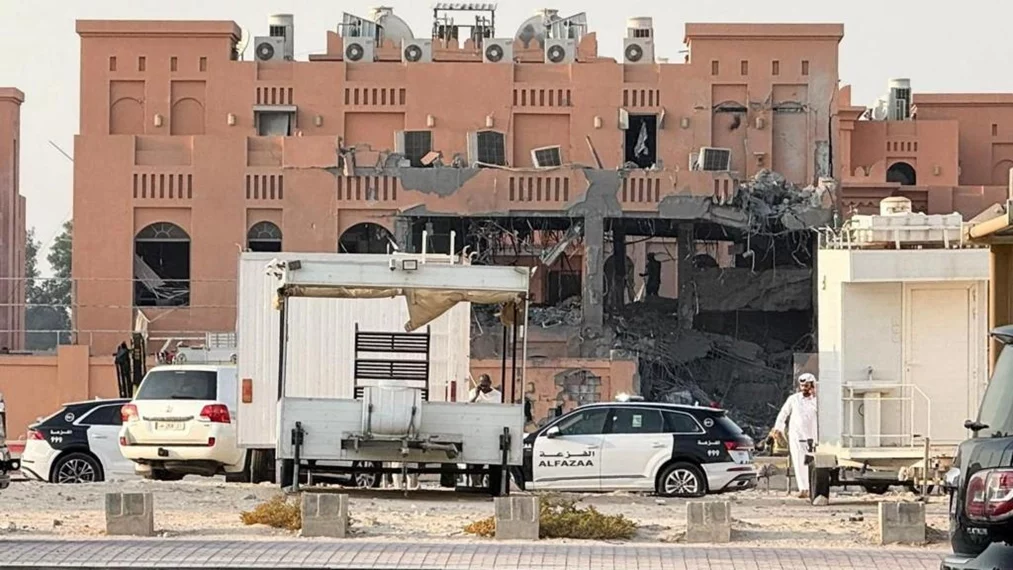Israel’s airstrike on Hamas leaders in Qatar has sparked a wave of regional and global outrage, with critics accusing Washington of giving Netanyahu a green light.
Israel’s bold strike in Qatar sparks regional outrage

In a dramatic escalation that sent shockwaves across the Middle East, Israel carried out an audacious airstrike on Hamas political leaders in Qatar on Tuesday. The strike, which killed five Hamas members, including the son of Gaza’s exiled chief negotiator Khalil al-Hayya, was widely condemned as a violation of international law.
Qatar Condemns Israeli Strike, Warns of Retaliation
Qatar, caught off guard by the operation on its soil, reported the death of one member of its internal security forces and injuries to others. Political analyst Dr. Ali Al Hail told The Beiruter that the strike was a blatant violation of Qatari sovereignty. He criticized President Trump’s remark to a journalist, calling it “hilarious,” in which Trump reportedly said, “Israel is a democratic state that does not attack anyone.”
Al Hail claimed that President Trump is involved in everything, from the Gaza extermination war to the strike on Qatar. He said the operation was carried out with the full knowledge of the Trump administration, insisting that
Without Washington’s green light, Netanyahu would never have dared to carry out this attack
He also pointed out that all Hamas leaders survived, underscoring the operation’s failure and its focus on violating Qatari sovereignty above all.
Emir Sheikh Tamim bin Hamad al-Thani warned that Qatar “reserves the right to respond to this blatant attack and will take all necessary measures to respond.” Long a mediator between Israel and Hamas, Qatar denounced the strikes as “cowardly” and labeled Israel’s actions as “state terrorism.” Prime Minister Sheikh Mohammed bin Abdulrahman al-Thani warned that the attack threatens ongoing peace talks and jeopardizes Doha’s role in brokering a ceasefire.
Lebanon Joins the Chorus of Condemnation
Lebanese President Joseph Aoun condemned the airstrike as “part of a series of aggressions committed by Israel, which demonstrate its determination to strike all efforts made to achieve stability and security in the countries of the region.” The Lebanese government called on the international community to act against repeated Israeli aggression, warning that such strikes jeopardize “security and stability in the entire region.”
Airstrike in Qatar draws Palestinian condemnation
The Palestinian leadership reacted swiftly and forcefully to the Israeli airstrike in Qatar. Hussein al-Sheikh, vice president of the State of Palestine, condemned the operation as “heinous” and a violation of international norms. Palestinian Islamic Jihad described the strike as a “blatant criminal act,” stressing that it targeted political leadership engaged in mediation and dialogue rather than combatants.
Hamas denounced the attack as an “assassination attempt” and a “heinous crime,” accusing Israel of deliberately undermining ongoing negotiations under the pretext of ceasefire talks. The movement warned that such operations threaten the fragile diplomatic channels aimed at securing peace and the release of hostages, and could provoke further escalation in the region.
Analysts point out that the strike represents not just a tactical attempt against Hamas figures, but a strategic message aimed at destabilizing Palestinian political coordination and deterring future mediation efforts.
 U.S. President Donald Trump delivers remarks to the White House Religious Liberty Commission at the Museum of the Bible, in Washington, D.C., U.S., September 8, 2025. Photo: Evelyn Hockstein, Reuters.
U.S. President Donald Trump delivers remarks to the White House Religious Liberty Commission at the Museum of the Bible, in Washington, D.C., U.S., September 8, 2025. Photo: Evelyn Hockstein, Reuters.
Washington sounds alarm over Qatar strike
The U.S. expressed deep concern over Israel’s unilateral action in Qatar. White House Press Secretary Karoline Leavitt said that while targeting Hamas remains legitimate, striking in the territory of a close ally like Qatar, home to the largest U.S. airbase in the Middle East, does not serve American or Israeli interests.
President Donald Trump described himself as “very unhappy about every aspect” of the strike, emphasizing it was “not a decision made by me” but by Israeli Prime Minister Benjamin Netanyahu. Trump reassured Qatari officials that the U.S. would work to prevent such strikes in the future, highlighting Qatar’s vital role in mediating Gaza ceasefire talks.
The U.S. warned that the strike could derail ongoing negotiations between Hamas and Israel, threatening efforts to secure the release of hostages and end the nearly two-year-old conflict in Gaza. While reaffirming support for Israel’s counterterrorism objectives, Washington called for restraint, dialogue, and respect for international law to prevent further escalation.
Regional and Global Condemnation Grows
Saudi Arabia, Egypt, the UAE, and the GCC condemned the strike as a “blatant violation of sovereignty” and “dangerous escalation.” Iran, Iraq, and Turkey denounced the action as illegal and provocative. European nations including France, Germany, Italy, Spain, and the EU urged restraint and voiced support for Qatar.
Other Middle Eastern nations echoed Lebanon’s call for accountability. Kuwait, Jordan, Morocco, Syria, Sudan, Oman, and Algeria condemned the strike and expressed solidarity with Qatar. Yemen’s Houthi movement warned that similar attacks could extend to other countries unless the region unites to confront Israel.
A Dangerous Escalation
United Nations Secretary-General António Guterres condemned the strikes as a “flagrant violation of sovereignty and territorial integrity” and urged all parties to focus on achieving a permanent ceasefire. Pope Leo also described the situation as “very serious,” highlighting the global concern surrounding Israel’s actions.
As the dust settles, Lebanon and its regional partners are watching closely, calling for coordinated diplomatic pressure to prevent further destabilization. The Israeli strike in Qatar has rattled the delicate architecture of Middle East diplomacy, leaving nations from the Gulf to Europe scrambling to respond.
While Israel maintains the operation was justified, the overwhelming international backlash underscores the fragile balance in the region. For Lebanon, the airstrike is a stark reminder of ongoing tensions and the need for vigilance in protecting regional stability and security.


